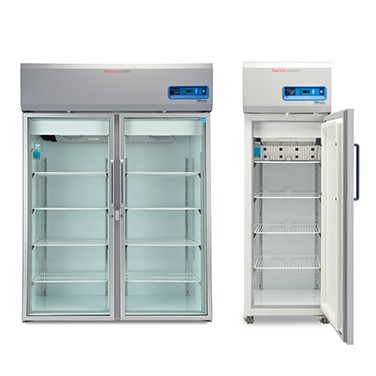Finding Cold Storage Solutions
Biological materials play a critical role in discovering novel therapeutics and managing public health. During the twentieth century, small chemical molecules were key to medical treatments. Now, advanced therapeutics include antibodies, cells, tissues, and other biological substances.
This shift from chemistry to biology represents a new era. However, biological materials can degrade — they may lose structure and function over time or with temperature exposures. Maintaining proper temperatures in the short and long terms is crucial to preserving biological functionality.
Laboratory Refrigerators and Freezers
Cold storage units built for laboratory or medical use are designed to limit temperature variation and maintain peak variation, temperature uniformity, and open-door temperature recovery. Commercial refrigerators and freezers are not designed with these same considerations.
While retail cold storage units may be less expensive, they may demonstrate temperature drift, have warm and cold areas within the cabinet, and return to temperature setpoints less rapidly after frequent opening. Internal temperature mapping performed on a 20 cu. ft. retail refrigerator showed a peak variation (the deviation from the lowest and highest temperature) of –5.5° to +5.5°C. In comparison, the peak variation of a 30 cu. ft. high-performance lab refrigerator was significantly less: –2° to +1.3°C.
Retail-grade refrigerators and freezers are not usually tested to meet laboratory safety standards like UL 61010. Because they are not recommended for laboratory use, insurance companies can deny claims for overt failure or damage to samples.
What Are Your Requirements?
There are many refrigerator and freezer options available in today’s markets. Ask these questions to help determine the best cold storage equipment for your needs:
- Which products will be stored? Are the products critical or temperature sensitive?
- What temperature setpoint and performance will ensure sample or product stability?
- How much room is needed to avoid overcrowding?
- Does access to the samples or products require locks or security?
- What regulatory or sustainability standards must be met?
- Does the equipment need to be qualified or validated?
Performance data can also help you determine which unit is right for your application. Technical data sheets (TDS) include essential data about:
- Peak variation from setpoint — the difference between the highest and the lowest temperature observed during closed-door testing of the unit
- Uniformity — the maximum temperature difference between all measurements at a specific moment in time; typically published as the average uniformity
- Stability — the maximum temperature difference for a specific location throughout the test cycle; typically published as the average stability
- One-minute door open recovery — the time needed to reach the original setpoints after keeping the door open for one minute
Find Your Cold Storage Solutions
Thermo Fisher Scientific offers several lines of biomedical refrigerators and freezers with different sets of features and performance levels.
Thermo Scientific TSG Series Refrigerators and Freezers aredesigned for general-purpose applications with semi-critical reagents, media, proteins, and other samples and products. TSG units are also Energy Star certified.
Energy Star certified Thermo Scientific TSX Series High-Performance Refrigerators and Freezers are essential for labs working with vaccines, enzymes, chemotherapy and pharmaceutical compounds, and other temperature-sensitive samples and products.
TSX freezers are available with manual or auto-defrost features. The auto-defrost versions use forced air circulation for better temperature uniformity and maintain temperatures near –30°C to minimize the impact of defrost cycles. Choose manual defrost freezers for storing enzymes and other biologics that do not tolerate temperature variations. Their refrigeration coils are located inside the cabinet walls to provide temperature control and stability throughout the chamber.
Every lab, workflow, and sample type has specific needs and requirements. The right refrigerators and freezers are critical for your samples, biological materials, and vaccines. Purpose-built laboratory refrigerators and freezers can offer you the precise temperature control needed for valuable research samples, vaccines, and other pharmaceutical development materials.
From preparation to storage and thawing, you can be confident and compliant both on paper and in practice. Thermo Fisher Scientific offers cold temperature storage ranging from –196°C to +4°C to help you find the right solutions for every stage of your workflow.
Visit fishersci.com/acceleratingscience explore special offers on Thermo Scientific equipment and consumables.
| Product Line | TSX | TSG | |||
|---|---|---|---|---|---|
| Type | Refrigerators | Auto-Defrost Freezers | Manual Defrost Freezers | Refrigerators | Auto-Defrost Freezers |
| Temperature Range | 2° to 8°C, 5°C Setpoint | –35° to –15°C, –30°C Setpoint | –35° to –15°C, –20°C Setpoint | 2° to 10°C | –12° to –30°C |
| Sizes | 12, 23, 30, 45, 50 cu. ft. | 23, 30 cu. ft. | 12, 25, 30, 45, 49, 72 cu. ft. | 25, 49 cu. ft. | |
| Security | High/Low Alarms, Locks, Remote Contacts | High/Low Alarms, Locks, Remote Contacts | |||
| Sustainability | Energy Star Certified, SNAP Compliant | Energy Star Certified, SNAP Compliant | |||
| Applications | Biologics, Diagnostic Kits and Reagents, Enzymes, Industrial Testing, Molecular Biology, Vaccines and Pharmaceuticals, Clinical Applications, Columns, Cell and Gene Therapy | Biologics, Diagnostic Kits and Reagents, Industrial Testing, Molecular Biology, Clinical Applications, Columns | |||



